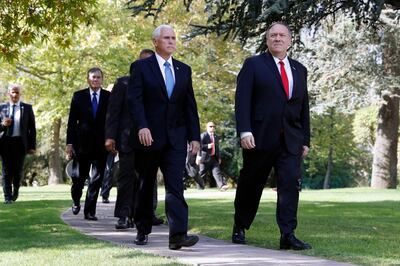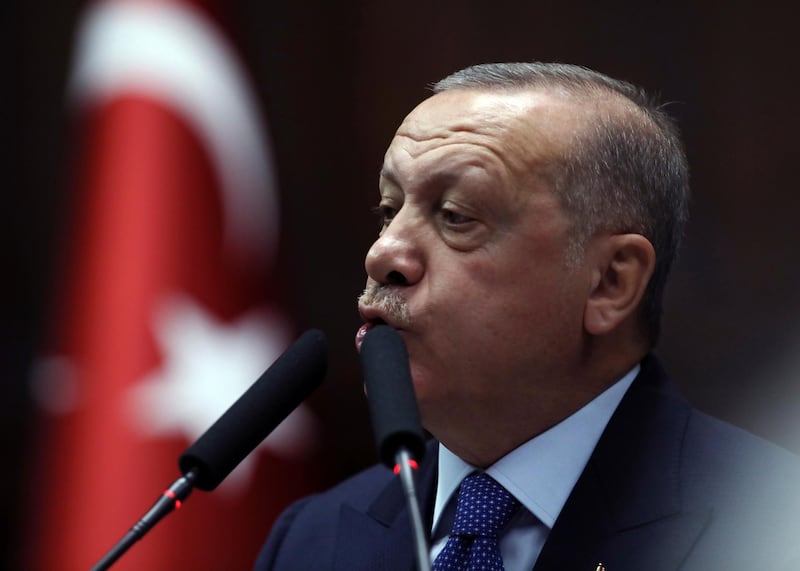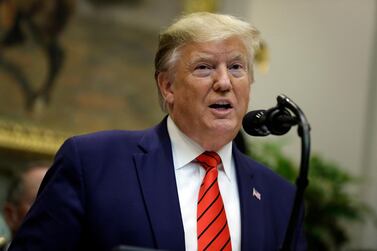US President Donald Trump might believe that the deepening conflict between Turkey and the Syrian Kurds is little more than a regional dispute that does not affect America. But Turkey’s insistence on maintaining its military offensive in northern Syria could have profound implications for its future relationship with the Nato alliance.
More than a week after taking his extraordinary decision to give Turkish President Recep Tayyip Erdogan the green light to launch his invasion of northern Syria, the American president remains completely unrepentant about his actions.
Far from having second thoughts about the wisdom of so openly betraying an American ally in the form of the Kurdish-led Syrian Democratic Forces (SDF), Mr Trump appears even more convinced about the wisdom of his action, describing it as "strategically brilliant"
Despite the SDF’s heroic performance in helping to destroy ISIS and its self-proclaimed caliphate, Mr Trump now says that the Kurds are “not angels”, and that it might be necessary for Syria and Turkey to “fight it out” over who ultimately controls the Kurdish-occupied territory in northern Syria.
The main priority, as far as Mr Trump is concerned, is that he has fulfilled his pledge, made immediately after the defeat of ISIS (achieved, in no small measure, with the help of the SDF), to bring home US troops.
“Our soldiers are not in harm’s way – as they shouldn’t be, as two countries fight over land that has nothing to do with us.” That, in essence, sums up Mr Trump’s attitude towards Washington’s long and controversial involvement in overseas military interventions in recent decades.
They are conflicts that the president claims have cost the American taxpayer an incredible $8 trillion, money he believes could have been better spent on rebuilding decaying US infrastructure.
But while Mr Trump makes no apologies for his “America First” approach, one that he hopes will win him re-election in next year’s presidential contest, there are many others in Washington who remain deeply concerned about the implications of his actions.
Chief among them is the fact that he is responsible for allowing hostilities to break out between a key Nato ally, Turkey, and the regime of Syrian dictator Bashar Al Assad, who is closely allied with Russia.
From Nato’s perspective, Russia remains the most potent threat to the security of the western alliance. Consequently, recent Nato summits have focused on strengthening their ability to resist hostile Russian acts.
A number of key Nato member states, such as Britain, France and Germany, also contributed to the US-led military coalition against ISIS.
The fact, therefore, that an important member of the Nato alliance now finds itself facing the possibility of a direct military confrontation against a Russian-backed ally is an issue of enormous concern for Nato leaders.
Article Five of the Nato treaty stipulates that any attack against one Nato member state constitutes an attack against the entire alliance. It has been implemented only once in the alliance’s 70-year history, in response to the September 11 attacks in 2001 that resulted in the US-led invasion of Afghanistan.
Thus, if Turkey were to find itself in a direct military confrontation with the Assad regime and its Russian backers, Ankara would have every right to call on Nato to come to its defence – just as Washington did in the aftermath of September 11 – and the West could find itself being drawn into a war with Moscow.
And, with Syrian forces already reported to have entered the strategically important border city of Kobane, the possibility of direct conflict between Turkey and Syria cannot be ruled out. Turkey and Syria have already come close to all-out war once before, over the disputed Kurdish enclave in northern Syria, when in 2006, Mr Erdogan threatened to invade the territory to root out what he called Kurdish terrorist groups.
Now, thanks to Mr Trump, the Turkish leader has got his way and is well aware of Nato’s commitment to help his country if the conflict continues to escalate. In his address to his ruling Justice and Development Party this week, Mr Erdogan said that he did not just expect the US and the rest of the Nato alliance to be neutral – he expected them to join in.

The likelihood, however, of any Nato nation responding favourably to Ankara’s suggestion is negligible, not least because of the barbed criticism Mr Erdogan has made about what he contends is western support for terrorist groups in Syria.
He has accused the West of sponsoring Islamic and Kurdish terrorists, and even claimed France provided the cement used to build Kurdish tunnels under the Turkish border.
There are other reasons, too, why, rather than rallying to support Turkey, many Nato members states are actively reviewing whether Ankara should be a member of the alliance.
Ever since Turkey joined in Nato in 1952, it was regarded as a vital strategic asset against what was then the Soviet Union.
Whether that remains the case today is an open question, particularly following Mr Erdogan’s recent decision to press ahead with purchasing Russia’s S-400 anti-aircraft missile system, which was specifically designed to shoot down Nato warplanes.
Despite the escalation of tensions in Syria, Mr Erdogan has managed to maintain good ties with Russian President Vladimir Putin, to the extent that he has been invited to a summit in Moscow to meet the Russian leader.
By contrast, Mr Erdogan has been lukewarm in his reception of US Vice President Mike Spence and Secretary of State Mike Pompeo, who have flown to Turkey as part of Mr Trump's belated effort to defuse the tensions caused by allowing Turkey to attack the Syrian Kurds.
Yet so far as Turkey is concerned, this initiative may prove to be too little, too late, as, with his latest Syrian adventure, Mr Erdogan has shown that he believes Turkey’s ultimate destiny lies towards the East, and not with its traditional allies in Nato.
Con Coughlin is the Telegraph’s defence and foreign affairs editor






